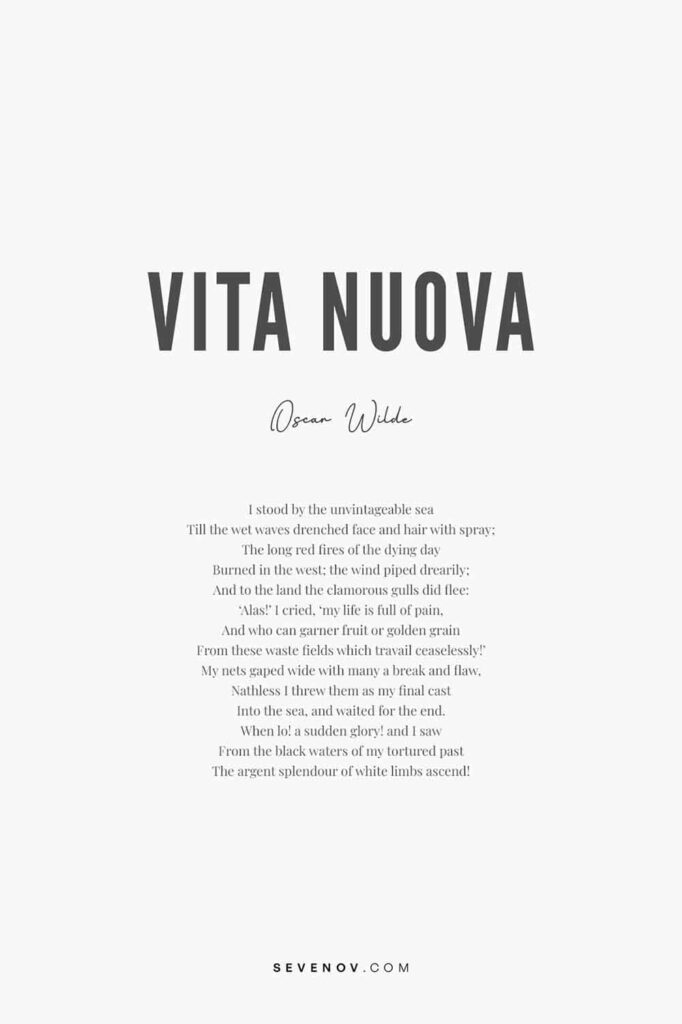
Vita Nuova by Oscar Wilde
“Vita Nuova” is a poem by Irish poet and playwright Oscar Wilde, featured in his first poetry collection Poems. This piece elegantly captures the essence of transformation and revelation against a backdrop of despair. For readers interested in exploring more of Wilde’s evocative poetry, Poems online book is available at PageVio.
1. The Poem
I stood by the unvintageable sea
Till the wet waves drenched face and hair with spray;
The long red fires of the dying day
Burned in the west; the wind piped drearily;
And to the land the clamorous gulls did flee:
‘Alas!’ I cried, ‘my life is full of pain,
And who can garner fruit or golden grain
From these waste fields which travail ceaselessly!’
My nets gaped wide with many a break and flaw,
Nathless I threw them as my final cast
Into the sea, and waited for the end.
When lo! a sudden glory! and I saw
From the black waters of my tortured past
The argent splendour of white limbs ascend!

Size: 8″ x 12″ (2:3 ratio)
Format: PDF
Copyright information: For personal use only
Note: Actual poster background color is white. For the sample poster, the background is made gray for illustration purpose.
2. Vita Nuova Analysis
“Vita Nuova” presents a narrative of despair turning into hope, using the metaphor of the sea to depict the speaker’s emotional journey. Let’s break down the poem:
Setting by the Sea
“I stood by the unvintageable sea / Till the wet waves drenched face and hair with spray;” – The poem begins with the speaker standing by the sea, which is described as ‘unvintageable’, suggesting it is barren and unyielding. The wet waves drenching the speaker symbolize being overwhelmed by life’s challenges.
“The long red fires of the dying day / Burned in the west; the wind piped drearily;” – The setting sun and the dreary wind create a melancholic atmosphere, reflecting the speaker’s mood.
“And to the land the clamorous gulls did flee:” – The fleeing gulls could symbolize an escape from adversity or turmoil.
Expression of Despair
“‘Alas!’ I cried, ‘my life is full of pain, / And who can garner fruit or golden grain / From these waste fields which travail ceaselessly!’” – The speaker laments their life filled with pain, comparing their fruitless efforts to trying to harvest from barren fields.
Metaphor of Fishing
“My nets gaped wide with many a break and flaw, / Nathless I threw them as my final cast / Into the sea, and waited for the end.” – Despite the damaged nets, symbolizing the speaker’s hardships and despair, they make one final effort, throwing the nets into the sea as a last attempt to find meaning or hope.
Transformation and Hope
“When lo! a sudden glory! and I saw / From the black waters of my tortured past / The argent splendour of white limbs ascend!” – The poem concludes with a transformation from despair to hope. The emergence of white limbs from the dark waters symbolizes a new beginning or a rebirth (possibly ‘Vita Nuova’ meaning ‘new life’). The ‘argent splendour’ suggests purity, renewal, or salvation emerging from the speaker’s troubled past.
“Vita Nuova” is a powerful depiction of overcoming despair and finding hope. The sea serves as a metaphor for the speaker’s emotional state, and the transformation at the end signifies a rebirth or new beginning after a period of suffering and hardship.
3. Conclusion
If “Vita Nuova” ignites your enthusiasm, consider exploring more of Oscar Wilde’s poetry on Sevenov.




